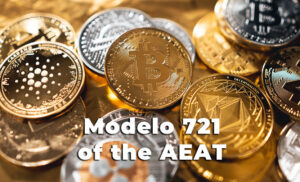
The Spanish Treasury already has three cryptocurrency models prepared, 172, 173 and 721, which will represent a new framework of unprecedented obligations for companies and individuals. The Spanish Tax Agency expects that taxpayers who own, provide, operate, mediate and/or guard these virtual currencies declare the balances and detail each operation carried out, with numerous parameters.
A new Modelo 721, is created to declare cryptocurrencies that are understood to be located abroad, in parallel to model 720 (obligation to report on assets and rights located and/or managed abroad), whose requirements have led to a file of the European Commission against Spain, a matter on which the Court of Justice of the EU has ruled a couple of years ago. The CJEU has overturned the associated sanctioning regime, as well as the concept of imprescriptibility, which allowed the AEAT to question the consummated prescription in favor of the taxpayer.
Modelos 172 and 173 must be submitted by all tax resident companies in Spain that participate in the world of cryptocurrencies: coin creators, exchange agencies, virtual wallets, those who provide services to safeguard private cryptographic keys on behalf of third parties, to maintain, store and transfer virtual currencies, whether said service is provided primarily or in connection with another activity. Thus, those obliged to do so will be residents in Spain, regardless of the place where they provide the services and the location of the coins or their holders. It is expected that these functions and obligations may also affect natural persons.
In Modelo 172, affected companies and individuals must declare their own and their clients’ virtual currency balances. Specifically, the balances maintained by the holders of virtual currencies, in charge of those who provide services on behalf of third parties to safeguard private cryptographic keys that enable the possession and use of such currencies, including providers of exchange services for the currencies if they also provide the possession service. These are the balances in each different virtual currency and, where applicable, in legal tender, as well as the identification of the owners, authorized or beneficiaries of said balances.
Modelo 173 for the obligation for companies to report on all operations they carry out, both in Spain and abroad: acquisition, transmission, exchange and transfer, as well as collections and payments made in said currencies, in which they intervene or median, presenting a nominal list of participating subjects with indication of their address and tax identification number, type and number of virtual currencies, as well as price and date of the operation. Those who make initial offers of new virtual currencies will have the same obligation, with respect to those they deliver in exchange for the contribution of other virtual currencies or legal tender money.
Regarding modelo 721, article 42 quater, which will be introduced in the General Regulation of tax management and inspection actions and procedures, develops the obligation to report on virtual currencies located abroad, in such a way that people physical and legal entities residing in Spanish territory, permanent establishments in said territory of non-resident persons or entities and the entities referred to in article 35.4 LGT, must file an annual informative declaration on all virtual currencies located abroad. Those of which you are the owner, or of which you are a beneficiary, authorized or otherwise have the power of disposal, or of which you are the actual owner, custody of persons or entities that provide services to safeguard private cryptographic keys on behalf of third parties, to maintain, store and transfer virtual currencies, as of December 31 of each year.
Please do not hesitate to call us if you have further doubts. Phone +34 915 194 392


0 Comments